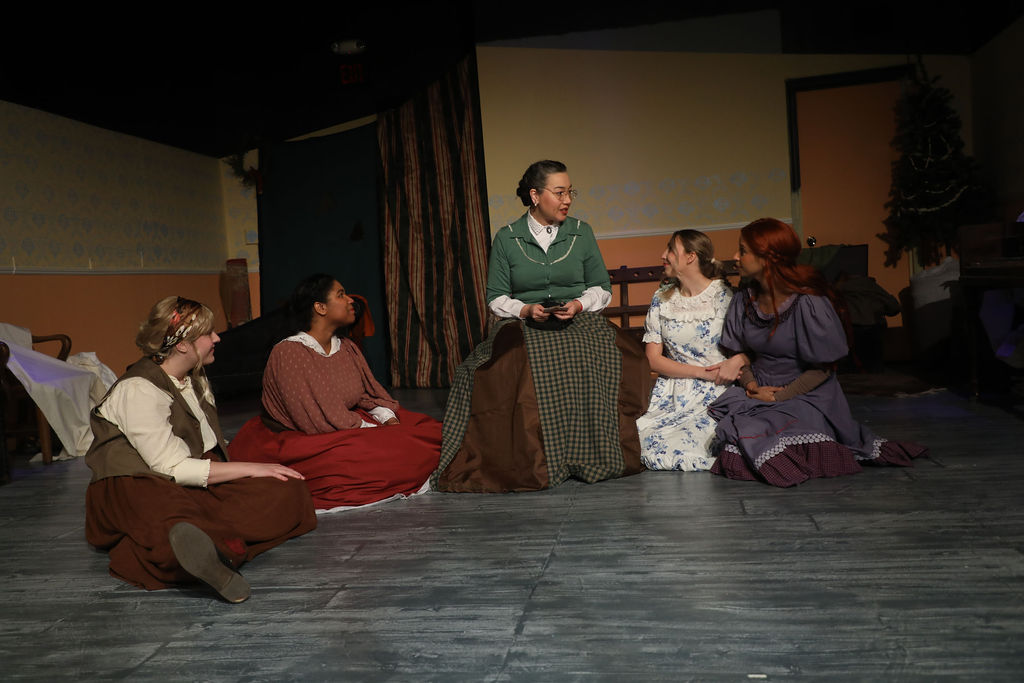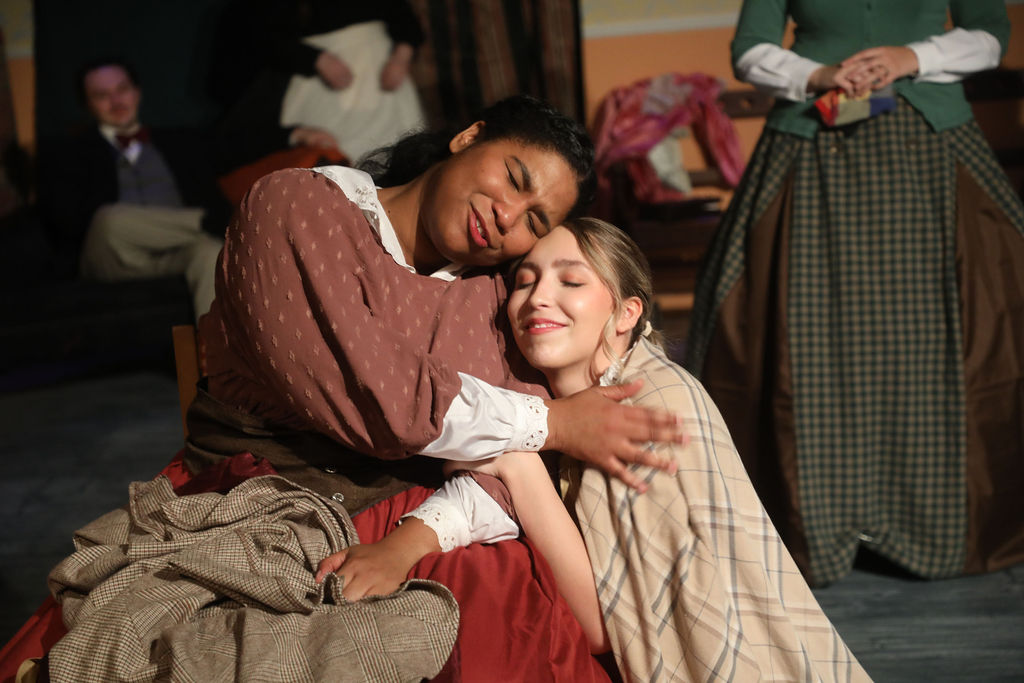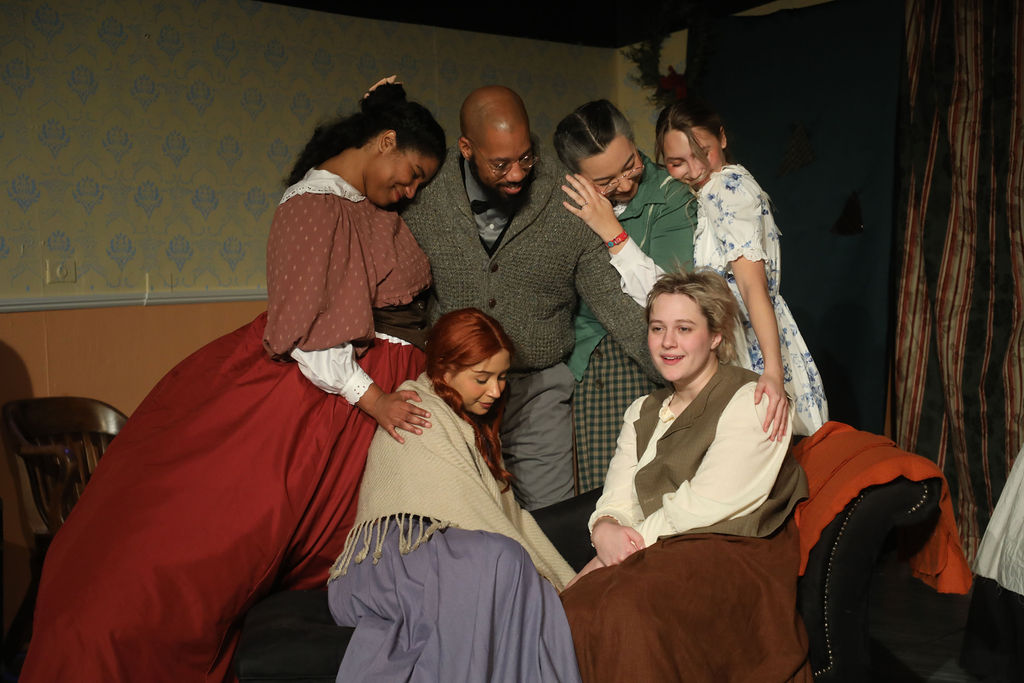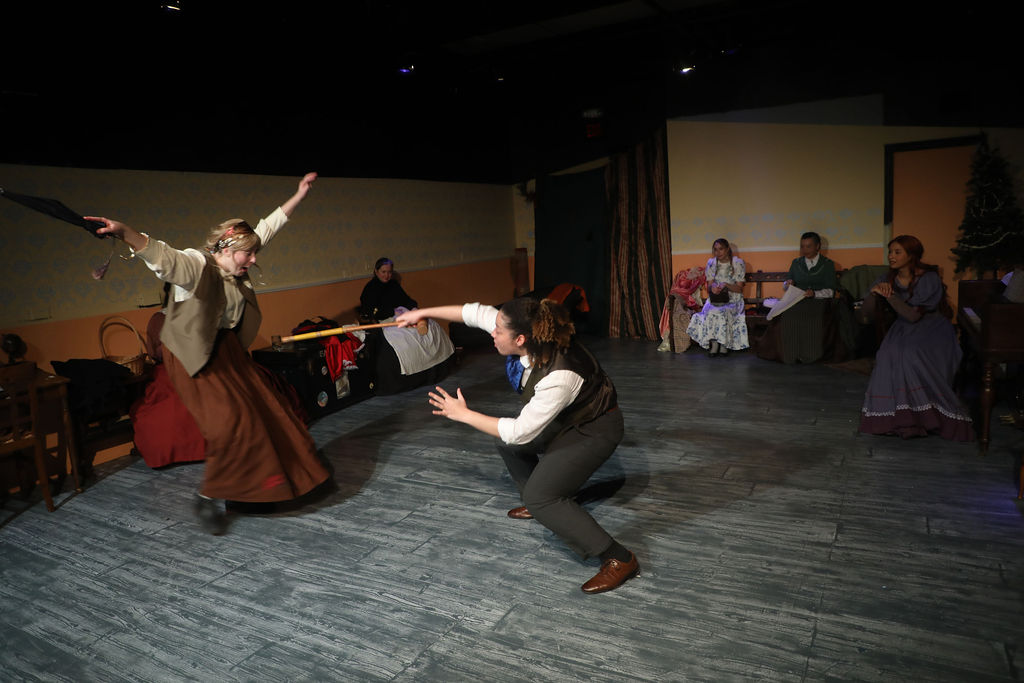“That when I come back to them I may be fonder and prouder than ever of my little women”
Ever since its first publication in 1868, Louisa May Alcott’s Little Women has captured the hearts of millions of readers all over the world. But considering at its face value the story of Little Women seems to be a mere fictional story focused on the 19th century domestic lives of four young American women living in genteel poverty, it is curious why this story would make such an impact on its readers and become a staple of classic American literature ever since.

But I believe that it is because, at its core, the overarching themes of identity, kindness through empathic actions, and finding one’s own sense of self-worth are themes that touch the lives and experiences of so many growing up regardless of place or time or society. And even beyond this, the characterization of the story’s tomboyish protagonist and narrator, Jo March (played by Will Murphy), allows the story’s audience to connect to a feeling of “same-ness” to Jo’s feeling of “other-ness” from their peers as they navigate their own thoughts and feelings entering adulthood as they seek to find comfort in their own skin.
For those unfamiliar with the story, Little Women follows the joys and sorrows of the March sisters Meg, Jo, Beth, and Amy as they come of age in New England during the 1860s. With their father away serving in the Union Army during the Civil War, the sisters and their mother (affectionately called Marmee and played by Penelope Chan) are left to their own devices to face life in genteel poverty.
As far as adaptations go, this particular adaptation, written by Erin Riley and directed by Kaitlyn Fowler, feels true and generally straightforward to the overall classic story. Act One largely encompasses the first year of the story of Little Women, while Act Two covers the years that follow our first Christmas with the March sisters and their transition away from childhood completely, and into the full world (and experiences) of adulthood. Marrying, leaving home, seeing the world, finding love, experiencing deep joy, and deep sorrow are all aspects of the adult life these young women encounter in their transition from “little women” to wholly adult. And while Riley’s adaptation is a fabulous and true rendition of the story, it feels like a very “safe” telling of the story; and I mean that in the sense that this particular adaptation has allowed for a safe space for all actors, regardless of gender identity, to explore these classic characters and tell their story in a way that feels secure and natural. (It is noted by the Director that for this adaptation, “…In our production Jo is written and played as nonbinary, and referred to as they/them, and called a March sibling as opposed to March sister.”)

Even in the ways it approaches Jo’s queerness in the sense that they feel “othered” from their siblings and the ways society dictates they should be feels subtle and blasé in a good way. Because that is the way that it should feel. While our contemporary era is currently experiencing new ways adolescents have to fear and tread carefully the time of their life when those just beginning to know themselves should be able to ask about and explore aspects of themselves to find themselves, in this telling of this journey, Jo’s character is provided a safe enough space where Jo is just able to explore finding Jo in a way that feels natural and secure.
One of my favorite instances of this was in the scene where Jo is coming to terms with cutting and selling their hair to provide money for a family emergency. While often portrayed in other renditions as a scene of trauma through losing the hair (and as one with long hair, I am not ashamed to admit I too have cried at a bad cut where too much was lopped off), this particular rendition seemed to feel like it suited Jo’s character more. Instead of mourning a physical part of them that was now missing, Jo admits that the feelings and emotions that swell within them are instead positive because they feel like somehow they found a new part of themselves with their shorter cut.
Played by the charismatic and magnetic Will Murphy, Murphy breathes an effortless and sincere existence into Jo March. Tasked with being the narrator and overall steward of the audience’s journey with the March siblings, Murphy is able to balance the comedy and drama of this portrayal of Jo through the years and shows the progression of Jo’s character from immature and outspoken adolescent, to witty and outspoken adult. Since Jo is the story’s protagonist, Murphy has the primary task of leading almost every scene and interacting (and reacting) to all the other characters. While Murphy brings something different to each interaction tailored specifically to the intricacies of each other character, there is a special connection that stands out in this production in the scenes between Jo and the March’s neighbor, Laurie, played by Adanya Elizabeth.

Elizabeth’s depiction of Laurie pairs beautifully with Murphy’s Jo in a way that both matches and reflects each other’s characteristics. That is to say, they were both in some ways identical to each other while also displaying opposite attributes to each other in a way that separately complemented without the need to ever complete the other. When together, the two brought out an energy in the other that was both playful and loving in a way only the best of friends can. What’s more, Elizabeth brought about an almost Peter Pan-esquness to their portrayal of Laurie that allowed for a temptation for Jo’s character to remain childish, breaking the spell only when Laurie’s character proposes marriage, creating a realization for Jo that not everything was fun and games in their relationship. While Elizabeth’s portrayal is overall jovial and impish, once rejected, they also perform Laurie enchantingly sulkily in a way that was reminiscent of both a child who did not get the toy that they wanted while also conveying heartbreak from something they thought they wanted.
But Jo is by no means the only March sibling worth mentioning! Meg, played by Alex Reeves, brings a light-hearted and caring energy to the eldest of the March siblings. The first of the four to have to deal with the prospects of marriage, Reeves encapsulates the titillating excitement of the first notions of love, while also displaying both a terrifying pragmatism towards love and marriage, and a fierce defense of love when under attack. Opposite of this “future momma bear” energy is the third and most timid sibling, Beth, played by Nina Jones, who balances the rowdiness of all the March siblings with her quiet and shy demeanor. Bringing up the end of the line, but by no means in last place is the youngest sibling, Amy, played by Liv Blair. Being the youngest, and most child-like, Blair has plenty of opportunities for comedy with her antics as the sibling who is both the most immature, and the most aspirational to become a “proper” lady of society.
Sharing the stage with the March siblings are the “adults” of the cast. Marmee, played by Penelope Chan, brings a soft and loving energy as the supportive and encouraging mother of the children, while Joseph Jones Jr. compliments Chan’s caring parental energy both in his portrayal as Mr. March and as their rich and kindly neighbor, Mr. Laurence.
Julia Williams wears several hats in this production (literally) playing three distinct and all together different characters. The most endearing of the three is definitely the stern and old fashioned, yet caring in her own way “thank you very much,” character of Aunt March. Being a distant Aunt, and the only March with substantial money and footing in elevated society, Williams brings a charm and humor to an otherwise uptight character in the most endearing of ways. Williams has a way of commanding the scene while never detracting from the attention of the action of the scene, and always serves as a means to help elevate things further.

Similarly, Henry Kramer also plays multiple roles and brings warmth and depth in different ways to both. For Kramer, you see, plays two of the love-interest characters in this production outside of Laurie. When portraying Meg’s beau Mr. Brooke, Kramer handsomely encapsulates the sensation of the youthful blossoming of love when meeting and later courting Meg that is reminiscent of “butterflies in his stomach.” Then fabulously changing altogether to the more playfully-mature, and German, Prof. Bhaer when befriending, and falling in love with Jo.
The set and lighting (designed by Robert Brooks) are intentionally sparse and standard, but that is to allow the actors the chance to truly shine and bring the story to life on stage. One interesting choice of this design was to have chairs present all around the walls of the stage to allow for the actors/characters to sit in between scenes. This is because once a character enters the stage, they are present throughout as a living set piece to the story unfolding before our eyes. A particular observation I made throughout was that I realized the action of the scenes were captivating enough that when several actors had the need to change costume pieces (again, out in the open, there on stage!) I noticed I hadn’t the slightest notion this had happened until suddenly a new character with a new costume had burst into the scene.
Though set in a different time, and while not all of the social restrictions experienced during Alcott’s era are wholly applicable to modern times, there are enough common threads to the coming-of-age experiences of the March siblings that continue to resonate with readers and audience members today. While this classic American story is charming all on its own, the true sparks of this particular production come from the very talented cast on the stage. Whether you know the story by heart, or have never heard of Little Women, I encourage you to venture out to The Strand Theater this December for a chance to enjoy the joys and the heartache that comes with the timeless tale of Little Women!
Running Time: Approximately 2 hours and 30 minutes with one intermission. Christmas Caroling with the cast begins 20 minutes prior to curtain.
Little Women plays through December 17th 2023 at the Strand Theater— 5426 Harford Rd. in Baltimore, MD. For tickets call the box office at (443) 874-4917 or purchase them online.
